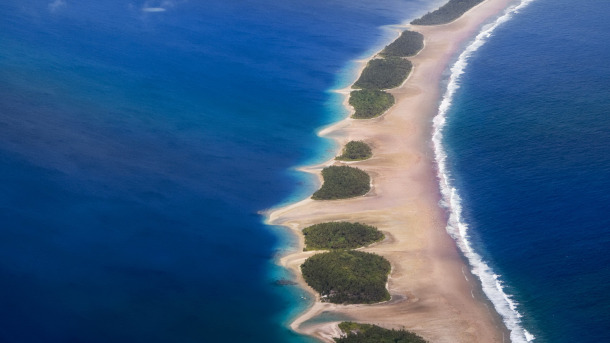Miseducation: How Climate Change is Taught in America
Air Date: Week of March 11, 2022

In the United States education is primarily a state and local responsibility: curricula and the requirements for enrollment are developed by communities as well as private organizations. (Photo: Nenaj Stojkovic, Flickr, CC BY 2.0)
Investigative journalist Katie Worth joins Host Bobby Bascomb to talk about her book Miseducation: How Climate Change Is Taught in America. It reveals the access fossil fuel companies have to American children and how that differs across red and blue states.
Transcript
BASCOMB: And I’m Bobby Bascomb. The science of climate change has been highly politicized in the United States. And that political fight extends even into our classrooms. In her book Miseducation: How Climate Change is Taught in America, journalist Katie Worth explores the access fossil fuel interests have to American children and the red state blue state divide on climate science education.
Katie Worth, welcome back to Living on Earth!
WORTH: Thanks so much. I'm really glad to be here.
BASCOMB: So what inspired you to write this book about miseducation and climate change in American schools?
WORTH: Well, years ago, I was on this show and talking to you about my trip to the Marshall Islands, where I was, at the time a reporter of PBS Series Frontline. And a colleague and I were assigned a story about climate change in the Marshall Islands. And for those who don't know, it's a Pacific Island nation and it's extremely vulnerable to climate change because its highest point is something like 12 feet above sea level on these islands. And so the entire nation, you know, you can imagine just a foot or two of sea level rise could be a big problem in an island that low and so the entire nation could kind of be existentially threatened by climate change. And so we were there, and we were talking to kids and we were really struck by how fluently they could talk about climate change. Its cause, what it might mean for their lives. And one of the kids Izermen, he was nine years old, he had first learned about climate change at age six, and he'd learned about it in school every year since then. And his family was considering moving to Oklahoma, where they had some extended family. And so, you know, the question arose- okay, well if Izerman moves to Oklahoma, what will he and his siblings learn about climate change there. So that was one of the origin stories of this book. I also, right around that time, I was doing some reporting on climate denialism. And I went to a conference hosted by the climate denial organization, Heartland Institute. And they told me while I was there, that they were starting to send out packets to every science teacher in the nation, they claimed to send out more than 200,000 of these packets. That included a book called Why Scientists Disagree About Climate Change. Which we know they don't. And a DVD about solar cycles and how the recent warming can be explained by solar cycles, which, you know, scientists say that it can't. So the kind of confluence of those two events made me realize, oh, there's some really rich reporting territory here and this is worth digging into.
BASCOMB: You have in the front of your book, this US map that shows me just open the page here. It shows a map of the United States and it has Republican controlled legislative states and Democratic states. And overlaid with that is a grade for each of the states and how they're teaching climate science. Can you tell us about that map and what it shows?

According to the World Bank, sea level rise is projected to endanger 40 percent of existing buildings in Majuro, the capital of the Marshall Islands. (Photo: Keith Polia, Flickr, CC BY 2.0)
W0RTH: Yeah, sure. Um, so an organization called the National Center for Science Education teamed up with another organization called Texas Freedom Network, and they hired a panel of educators to look at each state's academic standards, science standards, and how they treat climate change. So I just said a lot of words there, so academic standards are just a state's expectations of what a kid's going to learn any given, you know, year, basically, or subject. And they sound really mundane and arcane and they are, but they're actually really powerful, because teachers absolutely look to them to decide what they're gonna teach in a year. And we don't have a national curriculum so it comes down to what the states say. And so this panel looked at each state's science standards and how they treated climate change on the basis of four different criteria: whether a kid would learn that climate change is happening, that it's caused by humans a little bit about what the effects might be, and then that a little bit about what the solutions might be, that there's some hope. And then rated them and then those ratings were turned into letter grades. So what I did was then I mapped it onto this red, blue, purple map of the states based on who controls the state legislatures. And then what we saw is kind of what you would expect. There was no blue state that got worse than a B+. And there were red states that did great. Actually, there were, you know, I think Wyoming gotten A, Alaska got an A or A-. So there were a handful of red states that actually do this very well. But the majority of the red states did considerably worse. There were many states that got C's, D's and F's on this question. And so what that means is you can kind of roughly guess what a kid might learn about climate change in their education by knowing what political party runs their state legislature. Not based on what the science says. And you know, that's problematic because of course, the climate crisis doesn't stop to check who's running the state legislature before striking a community you know, it's like equal opportunity. No matter where you live it's gonna affect your life. And kids in every state have a lot at stake in this question.
BASCOMB: So what do we have in the way of national standards for how to teach climate change? And how is that actually interpreted by the states?
WORTH: There is actually no national standards. But there was a group of educators from all over the country that came together and tried to create kind of a model set of standards that they thought was better than what most of us had growing up and kind of using the latest kind of pedagogy, how kids actually learn science. And they created what's called the Next Generation Science Standards. But it's not like a federal effort that is then being laid down on the states, every state has to approve it. To the contrary, the people who wrote the standards who were from all 50 states then went back to their states and asked the legislatures to adopt these next generation standards. And some of them did, and some of them really rejected it. And some of them amended it. So like Oklahoma, for example, adopted Next Generation Standards, mostly, but then they erased all the standards that had anything to do with climate change in 2014. So like, they didn't even propose it to their legislatures. They also, as it happens, erased the word evolution from the standards, and they instead swapped it out with the words like kind of euphemisms like development or change over time, because the E word, evolution is still kind of, it's kind of a hot button topic in Oklahoma. And so there's a lot of states that kind of did that tweaking that watered down the standards. And then there's states that just absolutely rejected the next generation standards and stuck with their own processes. Texas is one of them who has really adamantly stuck with its own standards. And that's a problem because Texas is one of the largest purchasers of textbooks in the nation, right? So textbook publishers pay attention to what Texas is approving. And then that then becomes the next generation of textbooks that is then sold to districts around the country. So it's like, these things do tend to have, you know, what happens in Texas does have a national effect. And so it does wind up affecting kids and even in blue states, sometimes what is happening in red states.
In #Miseducation, investigative journalist Katie Worth reveals big inequities in #climate education and a gap that mirrors state politics. @Revelator_News https://t.co/xY5mnRn2ct
— Daily Climate (@TheDailyClimate) November 17, 2021
BASCOMB: Well, let's talk a bit more about the fossil fuel industry. You write here in your book that they actually have a long history of taking their message directly to schools. Can you tell us more about that?
WORTH: So the fossil fuel industry has really greened, their image, worked to, you know, they no longer publicly deny climate change, they say that they care about it. There's all of these, you know, ads that you can see from Chevron from Exxon saying that they're working on the climate issue, that we all need to work on the climate issue. But I was sitting in a classroom in Arkansas, reporting on what was being taught there. A representative of the Arkansas State oil and gas industry association, and she was there with a PowerPoint presentation for the seventh graders. And she, it's her whole job to go classroom to classroom and give this PowerPoint presentation. And, you know, it included some good information about the geology of Arkansas, where you can find oil and where you can find gas and the technology used to extract it stuff that we should know that students should learn. But then there was a whole section about climate change effectively. And she said that, you know, basically told students that it wasn't something that they needed to worry about. You know, China and India were the ones causing it. And even if you shut down every fossil fuel emitted by the United States tomorrow, you would just have a 0.0001% impact on the climate, which is blatantly false. You know, and she's like, and windmills kill birds, so every source of fuel has a problem. You know, equating windmills killing birds with this crisis that will change all of the planet. So it's just like, it was very much the talking points of the industry, and it was directly being fed to seventh graders. And the teacher was deferential to her and so were the seventh graders. They didn't ask any critical questions.
BASCOMB: So to what degree are you seeing this climate denial being taught in schools actually taking effect and children, you know, pushing back on the science of climate change?
WORTH: I grew up in a town that's only about 15 miles away from Paradise, California. And you might remember that that's the town that burned to the ground in 2018, due to a mega fire.
BASCOMB: Yeah.
WORTH: And the fire was sparked by, you know, poorly maintained utility lines, but it was really fed by climate change. The five hottest summers all had occurred in the last five years before the fire and it had rained less than a fifth of an inch in the last six months. So it was just bone dry. And then you know, the fire caught, the winds blew it very swiftly and it burned down 90% of the buildings in Paradise. So I went back there a few months later, and attended a seventh grade science class at Paradise Intermediate School. And the school had been displaced from Paradise into a shuttered hardware store and in Chico. So it was basically like a Lowe's like they were setting up a school in a Lowe's and all the students, the classes were in the aisles and students were getting lunch off of the checkout counters and playing freeze tag in the lumber center. You know, it was just very, very weird and surreal.

The Environmental Protection Agency (EPA) defines environmental education as “a process that allows individuals to explore environmental issues, engage in problem-solving, and take action to improve the environment.” (Photo: Nenaj Stojkovic, Flickr, CC BY 2.0)
BASCOMB: Oh gosh.
WORTH: And so this teacher, he teaches climate science every single year and this year he was teaching it to children who were arguably climate refugees, right? So I watched, I was there for a couple of weeks and watched him teach it and at one point one of the kids raised his hand and said- "Hey, I'm really confused because my parents say this isn't real. Like, there's no such thing as climate change. And, you know, I don't know who to believe". And I thought that the teacher Mr. Kessler handled it really thoughtfully. He said, you know, it can be really confusing when you get different information from different people in your life. But I'm not here to tell you what to think. I'm here to just provide you with the very best evidence that I can. And that's what science is, is looking at evidence and making an analysis and discovering what is happening and you get to do that you get to make your own analysis, you get to look at this NASA Data, and NOAA data and think about what is happening. And I thought that was really like a beautiful way to sidestep the, you know, like what your parents are wrong, which they are but empower the student to think for himself, which he may not in that moment. Iif the most important people in his life believe something, he's likely to believe it too. But, you know, the more messages he gets like that, as when he becomes a decision making adult, he may have a different perspective. And in fact, a couple days later, Mr. Kessler gave the class a writing prompt: Do you think that climate change has affected your life? And do you think it will affect your life in the next 50 years? And the little boy said, I don't think climate change has affected my life at all yet. And I don't know if it will affect my life in 50 years, because I don't know if I believe it yet.
BASCOMB: Gosh, what does it take? I mean, home, you know, literally burned down and, you know, learning in a school in the aisle of a hardware store. Well, what can parents do, if you're concerned maybe about how your children are being taught climate science in school?
WORTH: So I mean, I think just paying attention to what's happening in your kids' school is important. And it's hard to imagine a top down kind of federal effort working, because it hasn't been a good record of the federal government getting involved in state education. But you know, these fights over what exactly is going on. Paying attention to what's going on in your state standards. The Texas state standards, you know, the fossil fuel industry was at every one of these meetings, and sometimes they were the only ones, or not necessarily the only ones but there wasn't a big counterweight of teachers and parents saying- “No, this is an important issue, we want our kids to know what the solutions may be. And they need to know that that's important”. And so you know, had there been kind of a bigger voice in that direction. Maybe it would have played out differently.
BASCOMB: Katie Worth is a journalist and author of Miseducation: How climate change is taught in America. Katie, thank you so much for taking this time with me today.
WORTH: I'm really glad to be here. Thanks for having me.
Links
Find the book Miseducation here (Affiliate link helps donate to LOE and local indie bookstores)
Miseducation is published by Columbia Global Reports
Learn more about the National Center for Science Education
Connect with Katie Worth via Twitter
Watch a live interview from the Paleontological Research Institution with Katie Worth
Living on Earth wants to hear from you!
Living on Earth
62 Calef Highway, Suite 212
Lee, NH 03861
Telephone: 617-287-4121
E-mail: comments@loe.org
Newsletter [Click here]
Donate to Living on Earth!
Living on Earth is an independent media program and relies entirely on contributions from listeners and institutions supporting public service. Please donate now to preserve an independent environmental voice.
NewsletterLiving on Earth offers a weekly delivery of the show's rundown to your mailbox. Sign up for our newsletter today!
 Sailors For The Sea: Be the change you want to sea.
Sailors For The Sea: Be the change you want to sea.
 The Grantham Foundation for the Protection of the Environment: Committed to protecting and improving the health of the global environment.
The Grantham Foundation for the Protection of the Environment: Committed to protecting and improving the health of the global environment.
 Contribute to Living on Earth and receive, as our gift to you, an archival print of one of Mark Seth Lender's extraordinary wildlife photographs. Follow the link to see Mark's current collection of photographs.
Contribute to Living on Earth and receive, as our gift to you, an archival print of one of Mark Seth Lender's extraordinary wildlife photographs. Follow the link to see Mark's current collection of photographs.
 Buy a signed copy of Mark Seth Lender's book Smeagull the Seagull & support Living on Earth
Buy a signed copy of Mark Seth Lender's book Smeagull the Seagull & support Living on Earth

